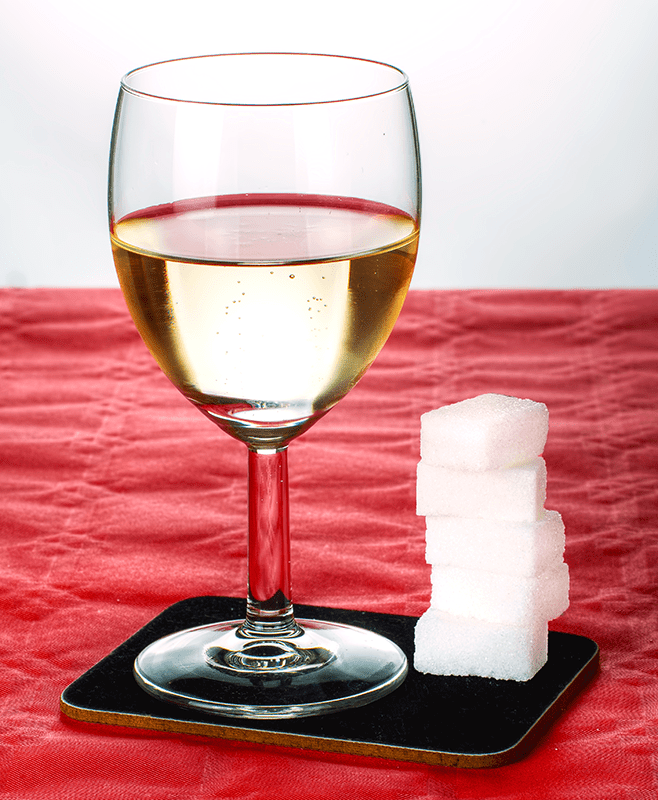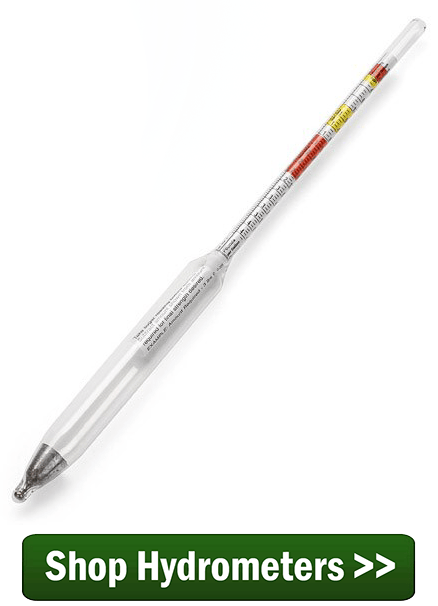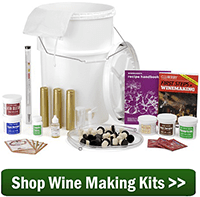 When making wine should I add all the sugar all at once or can I add sugar to the wine during the fermentation?
When making wine should I add all the sugar all at once or can I add sugar to the wine during the fermentation?
Name: Mark
State: Ohio
——
Hello Mark,
In general, you do not want to add sugar during fermentation. You will want to add all the sugar to the wine before the fermentation – all at once, upfront. There is no real advantage to spreading the sugar throughout the primary fermentation, just as long as you are shooting for a reasonable level of alcohol (10% to 14%). Any wine yeast you choose to use will be able to readily ferment to this level of alcohol, even when all the sugar is added to the wine must before the fermentation.
The biggest reason you’ll want to add all the table sugar all at once, besides the fact it’s less work, is that it makes it easier to calculate your wine’s finished alcohol.
Sugar is what turns into alcohol during the fermentation. This is fermentation 101. To know how much alcohol the fermentation is making, you have to know how much sugar has been fermented. This requires you to know how much sugar the fermentation started with and how much sugar the fermentation ended with. The difference is what was fermented into alcohol. Both of these things can be easily determined with a hydrometer by taking a reading before and after the fermentation and comparing the two.
 If you add sugar to the wine during the fermentation, additional hydrometer readings will need to be logged to eventually know how much alcohol is in the wine. These additional calculations can be annoying and even hard to remember to do. It requires you to pull out the hydrometer each time you want to add more sugar and take a specific gravity reading both before and after the addition of the additional sugar.
If you add sugar to the wine during the fermentation, additional hydrometer readings will need to be logged to eventually know how much alcohol is in the wine. These additional calculations can be annoying and even hard to remember to do. It requires you to pull out the hydrometer each time you want to add more sugar and take a specific gravity reading both before and after the addition of the additional sugar.
The only possible time you would want to add sugar fermentation is if you intend to make a high-alcohol wine. In this case you would want to start out the fermentation with enough sugar to reach 13% or 14% alcohol. Then as the fermentation runs out of sugar – which is determined with hydrometer readings – you will want to start feeding sugar to the fermentation in intervals.
The goal is to end up with a wine that is high in alcohol but not too sweet to drink. The fermentation will come to a point where the wine yeast can do no more. Exactly when that will be is not a certainty. It varies from one fermentation to the next, depending on a number of variables. When this happens you want little to no remaining sugar in the wine. This is the reason why you would feed the sugar to the fermentation as it progresses beyond 14%.
 So in the end I guess the answer to the question: “can I add sugar during fermentation?”, is yes you can. With the only side note being “but it only makes sense if you are making a high alcohol wine”. For any normal wine making situation, it is only creating more work to do so.
So in the end I guess the answer to the question: “can I add sugar during fermentation?”, is yes you can. With the only side note being “but it only makes sense if you are making a high alcohol wine”. For any normal wine making situation, it is only creating more work to do so.
Happy Winemaking,
Ed Kraus
—–
Ed Kraus is a 3rd generation home brewer/winemaker and has been an owner of E. C. Kraus since 1999. He has been helping individuals make better wine and beer for over 25 years.

I followed the instructions on the wine kit but only added the sugar 2 days later will this harm the wine
Paul, without knowing anything specific about the wine kit that you are making, I will say that we do not see any reason why you cannot add sugar 2 days after starting the fermentation.
Don’t you add a little bit of sugar to the wine at bottleing time so it will not be to dry ?
Raleigh, absolutely you can add sugar to a wine right before bottling. It’s a matter of personal taste. Remember though, it is important to added potassium sorbate at the same time, otherwise your bottles my start fermenting the newly added sugar. Here’s more info on this:
Making Sweet Wines
http://www.eckraus.com/wine-making-sweet/
What is the highest ABV wine you have come across? I know Baul is 22 percent desert wine,but I haven’t heard of any higher.
When I’m making my concord grape concentrate base with honey, I always put 3 quarts of the concentrate into 4. 5 gallons water, then add a half gallon honey, allow to ferment until it just starts to slow down and then add the other half gallon honey. Let it finish with its ferment and makes an unbelievable wonderful pyment. I use a 6 gallon fermentor and yes, it is pretty full.
I will use 2 packets of Danstar D47 for this and it works perfectly!
Making me thirsty for some…..To the cellar I am off………..
I added 2 cups of sugar to my peach/apple wine that was fermenting for at least a day. It was fermenting fine. After I added the sugar it (trying to increase alcohol content ) decreased significantly almost totally. I am afraid i raised the temperature and killed the yeast. If that is the case should i add potassium sorbate?
Marty, adding potassium sorbate will not prevent fermentation activity in a wine that did not complete fermentation. You need to get the fermentation to complete. If you think that high temperatures damaged the yeast, you need to get the temperature down between 70-75 degrees and add a new packet of yeast. I would also recommend monitoring the fermentation progress with a hydrometer. Since you can not always tell by looking, a hydrometer is really the only way to track the fermentation progress.
INCORRECT! It’s terrible to add all the sugar before fermentation because then you can actually turn the sugar into a preservative instead of a fermentation tool. Better to add it through the process to achieve control to the alcohol level and mind the process. If you’re making Franzia type wine, then dump it in the beginning and go on vacation.
I added sugar because it stopped fermenting, and was tart hopefully it will get sweeter
so in other word i could ad sugar during fermentation? right?? thank you soooo much. I’m actually doing a tomato wine as a school project and i want it to be the best. 😀
You, young man, are an absolute hero!
I started a wine kit and only put 2 cups in instead of 2 lbs. it’s been going on the first stage for 2 weeks. Could I add more sugar without ruining anything or should I just keep going with the process and chalk it up as a mistake.
Kiley, there is no reason why you couldn’t add the remainder of the sugar at this time.
i made a blunder and added only 6 cups of sugar instead of 6lbs of sugar. Should I add the rest. It has been fermenting for a few days now.
Randy, yes you can go ahead and add the rest of the sugar. If you do not, it will result in a lower alcohol wine.
Hi. Thanks for a great blog that I follow from my home in Denmark. And pardon my poor English!
I have a problem I hope you can help with:
During the first fermentation of apple cider I’ve experienced that the yeast have ‘eaten’ all the sugar in my apple must and the Oechsle now is 1000 (it started out with 1060!) And it has only been a week since I added the yeast.
Can I add additional sugar – and if yes how much) when I rack the cider in to the carbons?
Thanks!
Rikke, it just sounds like your fermentation completed quickly. The only reason you would add more sugar is if you want more alcohol. If more alcohol is your goal, one pound of sugar in a 5-gallon batch will raise the potential alcohol by about one percent.
Ok so I have 6 gallons (actually 36) of Catawba going the original gravity from winery was 16.75 Brix / 1.068. Let it ferment down to -1.3brix/ .996 after second rack then added sugar and brought the Brix back to 17/1.070. What is the equation to figure abv when this finishes?
Lamar, the article link posted below will help you calculate the alcohol content of your wine. The section that will help you is “Example Run Through”.
Making High Alcohol Wine
https://eckraus.com/wine-making-high-alcohol/
Hi, thanks for all the good info.
I am a newbie so when my Frontenac from our vines got to 0.97ish I thought I needed to add sugar to bring it to 1.03 before putting it in the secondary. After reading some of the other posts it looks like I could have just put it in the secondary.
So now that I put the sugar in and left it in the primary (about 7 hours) it does not appear to be fermenting any more (I also removed the skin/seed bag).
What is the best thing to do at this point? Add yeast? Just put it in the secondary and hope or see if it starts fermenting in the primary?
Thanks
Pete
Peter, You do want to transfer the wine off of the sediment and into the secondary fermenter. Leaving it on the sediment too long can cause off flavors in the wine. Because you cannot always tell by looking if it is fermenting or not, I would keep track of the progress with the hydrometer. If you find that it is in fact a stuck fermentation, take a look at the article listed below on the most common causes of fermentation failure.
Top 10 Reasons For Fermentation Failure
https://eckraus.com/wine-making-failure/
Hi Ed.
Could you please explain what the additional calculations would need to be to calculate the alcohol content when adding a single top up of sugar during fermentation?
I thought I had calculated the sugar correctly, scaling up a recipe for a gallon of apple wine, but my initial SG reading was at 1.056.
I didn’t realise it was too low and I have already added the yeast.
How can I calculate how much more sugar to add?
And how can I then calculate the alcohol content at the end of fermentation with the additional hydrometer readings?
Hope you can help!
Thank you
Tamsin
Tamsin, The article posted below will help explain how to make the calculations when adding sugar during fermentation.
Making Higher Alcohol Wine
https://eckraus.com/wine-making-high-alcohol/
Question, I am a wine making newbie & was so afraid of making sweet wine that I limited my sugar. Now I realize my mistake, after one month of fermenting & first rack, I still have grape juice tasting wine. Can I add sugar now without making my wine sweet?
Mommab, you will want to check it first with a hydrometer and if all your sugar is gone you could add a pound and wait 24hrs and see if there are any visible signs of fermentation activity and if so, you’re good to add the remainder of your sugar, if no action you will want to add another packet of wine yeast and, again, wait for 24 hrs etc… Make sure the room is between 70 – 78 degrees Fahrenheit and you should have a good second fermentation cooking in no time. I would recommend Lalvin ec-1118 wine yeast, my favorite.